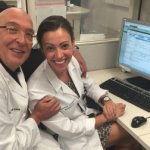Dr. Rosenbaum: Science doesn’t resolve questions; it finds answers that allow you a platform to ask additional questions. So the more that I discovered or that others discovered about the model that I stumbled on, the more unresolved issues were raised. And that still remains true today. Science is a lot like working on any kind of puzzle—a crossword puzzle, a Sudoku—but you don’t just turn to the answer in tomorrow’s paper, which makes it sometimes more frustrating, but all the more satisfying if you can gain a piece of the resolution.
TR: Over the years, has the endless loop left you frustrated or satisfied, a little of both? Do you still have that same quest to answer more questions?
Dr. Rosenbaum: I don’t think I’ve lost the curiosity. Maybe a little bit of the vigor, but I’m still asking questions. Often, one of the most difficult questions in the lab is knowing when to give up. Nothing ever quite succeeds as planned, and you keep revising and revising, and at some point you think, ‘Well, we just don’t have the tools or the reagents or the insight to answer this question.’ And you kind of put it aside, and then five years later, a decade later or 15 years later, someone’s made some sort of seminal discovery that relates to what you were doing, and you can approach it in a whole new light.
My dad would take us on rounds. What he showed was that he derived a tremendous amount of gratification from taking care of people.
TR: Fifteen years is a long time to wait for payoff. How do you do it?
Dr. Rosenbaum: You keep inching along. You make little small observations, but they’re not necessarily paradigm shifts. So you’re munching away, but every once in a while something happens, and it really makes you see the world in a different light.
TR: It’s difficult enough to keep up with the news and literature in just one set of journals, let alone the time to do two specialties. How do you keep current?
Dr. Rosenbaum: I think each of us is just a little fraudulent. As an ophthalmologist, I have deficiencies, but I have been very fortunate to have talented fellows and faculty members who could help me. And as a rheumatologist, I’m probably not the guy you want to have inject the small joint of your hand. But if you’ve got a patient who’s got an eye inflammation and who’s got a swollen joint, I’m definitely the person you want to discuss the problem with.


